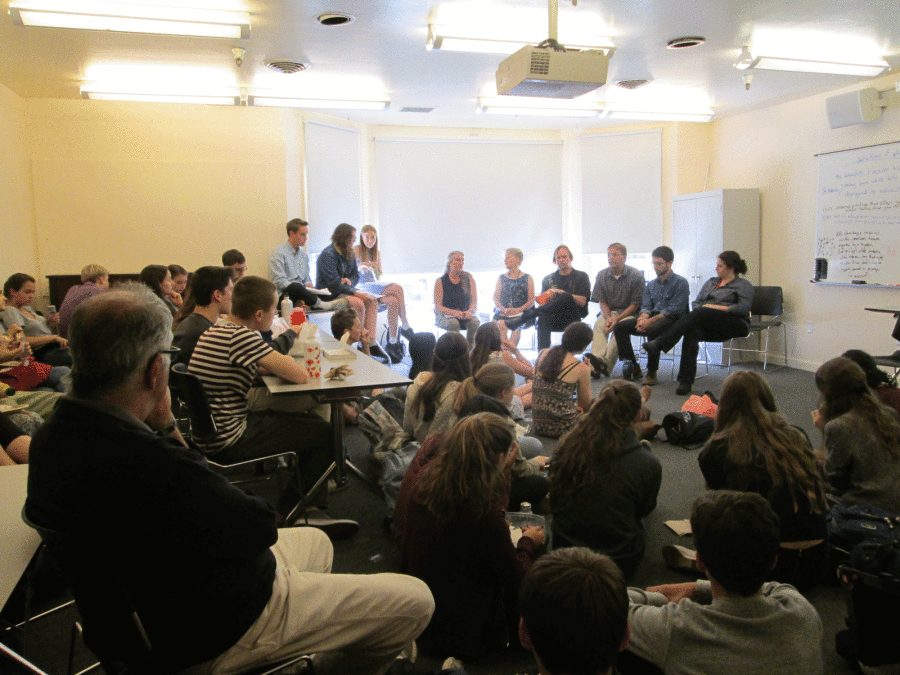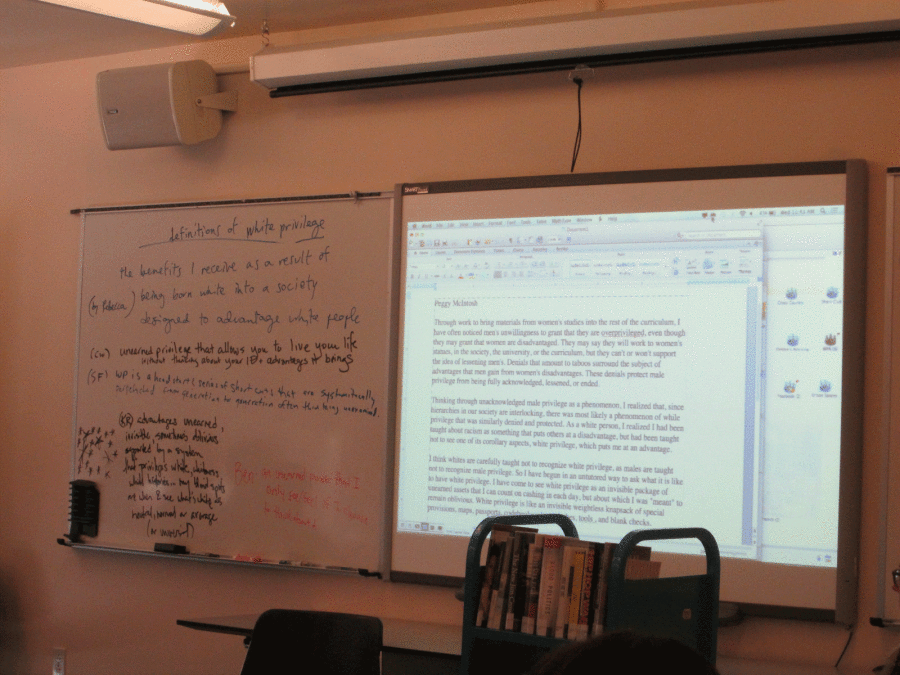White privilege faculty panel and students of color retreat make space for discussions of race
Students, faculty, and staff gather to hear panelists’ responses to questions on white privilege.
The term “white privilege” and, more importantly, the idea behind it, has been bouncing around the Urban community fervently for the past few weeks, following a controversial, anonymous submission to Urban’s “Appreciations Wall” that contained slang derived from the N-word. In response to this incident, members of the school have taken action to address why, at a school that prides itself on events like the Month of Understanding and the Affinity Show, this kind of language is still being used.
On Wednesday, Oct. 1 the faculty advisors to the Students of Color affinity group, along with other faculty of color, held a Students of Color Retreat in the St. Agnes Spiritual Life Center. The retreat was a time for self-identifying students of color to “reflect and discuss recent events (such as the usage of the n-word and others), provide space to build community, and provide support for students,” wrote Ken Garcia-Gonzales, Dean of Multicultural Life, in a message to the bulletin board.
“Part of the challenge of contemporary American society is the idea that affinity spaces are not necessary, and that somehow we all have the same experience, which we just don’t,” said Clarke Weatherspoon, history teacher and 9/10 grade dean.
“There is a certain level of stress that exists for students of color in a majority space that usually isn’t identified or acknowledged. It’s in the oxygen of what it means to be a person of color,” said Dawn Jefferson, English teacher and 11/12 grade Dean. “When you separate people out, roles shift a little bit. “The ‘you’ and ‘we’ may not exist in the same way … then (we) can reestablish a different ‘we,’” she said, referring to the importance of creating the affinity space to foster this discussion.
Simultaneous to the Student of Color Retreat, around 30 students and 15 faculty and staff, predominantly white, gathered in the Multipurpose Room for an open panel hosted by the White Privilege Awareness club. The club addressed questions about white privilege and listened to a panel of white teachers.
Garcia-Gonzales has played a key role in motivating teachers to involve themselves. Panelist Kate Randall expressed that she wanted to participate because of something that Garcia-Gonzales said in a staff meeting: “To have (the faculty and administration of color on campus) carry everything that’s going on is unfair.” Lautze said that Garcia-Gonzales “spoke with such rawness and such passion about this thing that was going on in the school that I was not privy to. I was not in the conversation about what was happening in parts of the community that were experiencing this hurt and this angst, and it just jolted me.” Lautze continued, “At first, I didn’t know what to do with that (feeling). I needed to get busy, to do some work to re-engage myself,” he said, “and I got reengaged in the community.”
In an email to the Legend, Ben Slater, English teacher, noted the importance of community engagement as an ally, “which is white people working in conjunction with people of color but largely in white communities, educating other white people about white privilege.” “The unconscious experience of white privilege seems to be the deepest problem here,” he wrote.
In addressing the importance of talking about white privilege, Scott Foster, music teacher, said, “the way that it gets perpetuated, and passed on, and continued, is by not examining it.” Doing so, he said, is “the most important thing in terms of trying to cause a culture shift.”
Charlotte Worsley, Assistant Head for Student Life, shared an anecdote of when she first understood the importance of the term: “I was working with an African-American, gay male … He said, ‘Tell me more about your European identity and culture.’ I said, ‘I hate when people ask me that.’” Worsley was shocked by how much her answer irritated him. “‘He said, ‘You have just as much of an identity and a culture as anybody else and you impose it on everyone else so it seems normal.’”
Many of the panelists referred to the cultural divides that are created when white people fail to recognize white privilege. Worsley said, “(white people) are being harmed by the system of white privilege. You are getting shut out of whole culture(s) that people aren’t going to share with you, because they risk getting really hurt.”
Speaking to the connections found here at Urban, and the recent topic of the N-word, the panelists had different views on what contexts it is acceptable in, but agreed that, as Foster said, “it’s just not for (white people).”
“What’s a slang word for a tall, white male?” asked Foster. Unidentified members of the audience offered “honkey,” “cracker,” and “jolly green giant” as responses, which were met with laughter from the audience. “Those words are not loaded for me … I have no reference for those to be hurtful,” he said.
The history behind the N-word is what gives it its meaning. The African American Registry, a nonprofit education organization, has a page titled “N—– (The Word), a Brief History.” The page reads: “Historically, n—–, more than any other word, captures the personal hatred and institutionalized racism directed toward Blacks.”
Rebecca Shapiro, history teacher, acknowledged how this historical significance can play into a person’s experience learning history. “When it comes up in my classroom, when it’s part of a document, when that language is getting used by people in a historical context, I’ll say the N-word word, the whole word, and I’ll let students decide what they want to say.” She said this was because “in the context of teaching and learning history … it can deepen someone’s understanding and someone’s learning to hear that word in that context of being full of power dynamics and privilege and hatred and oppression and ignorance as well.”
Worsley added that the administration’s job “is to make clear lines of what is going to be ok and not ok in public spaces.” She said, “There is not enough knowledge of (the) history of this word for us to even consider using (it). We made that clear line because the dominant culture of the school is white privilege.”
Randall noted that this ignorance tends to play out in the form of humor. “We think we’re being funny, and we’re not,” she said. Gwen McLaughlin (‘16), one of the leaders of WPA, added that a possible response to hearing an offensive joke is, “I don’t get it. Can you explain it to me?”
As parting words, some of the panelists offered other advice on how to move forward in interactions with white privilege. “ If you’re going to use the word ‘we,’ I challenge you to be very clear about who you’re talking about,” said Shapiro.
Randall said, “My best tool is to shut up and listen .”



